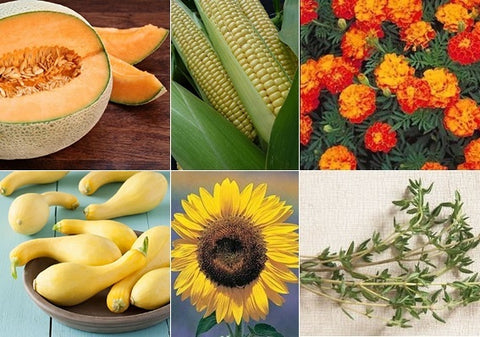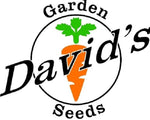Companion Planting Guide
This page is a companion planting guide to help you plan a successful veggie garden. Planting some things next to each other can enhance their growth and yield while other plants will inhibit growth and lower yield.

Learn what to plant together and what plants to keep away from each other in your backyard. There is not an exact science to it. Environmental factors like climate and soil play an important part. You may need to experiment with some plants to get it right, adding to the companion planting guide.
Make sure you take notes on what you plant with what along with the location in your garden so you rotate your planting location each year. Do not plant the same plant in the same place in your garden for at least three years. Make your own companion planting guide.
Basically, you want to plant your seeds to grow plants together that help each other grow better, be more flavorful, and that will attract beneficial insects to control the unwanted bugs that tend to destroy some plants.
Read our companion planting guide below to have a more successful garden this year! Add to it to make your own personal companion planting guide.

Asparagus
Asparagus should be planted with parsley, basil, nasturtiums, and marigolds.
Asparagus should not be planted by fennel (the vegetable and the herb) or garlic.
Basil
Basil loves and grows well with peppers (any kind), tomatoes, sage, thyme, and oregano.
Beans
Beans love to be planted with broccoli, carrots, cauliflower, corn, cucumbers, peas, rosemary, strawberries, Swiss chard, tomatoes, thyme, sage.
Be sure not to plant the carrots by the tomatoes. Doing so will make your carrots short and stubby.
Do not plant beans by chives, garlic, leeks, marigolds, onions, or peppers.
Beets
Beets should be planted with onions, Brussels sprouts, cabbage, kohlrabi, bush beans, and lettuce.
Do not plant the beans and onions next to each other.
Keep beets away from pole beans and mustard greens.
Broccoli
Broccoli likes to grow near beans, carrots, chives, cucumbers, dill, lettuce, nasturtium flowers, onions, rosemary sage, spinach, Swiss chard, thyme, and oregano.
Be careful not to plant your carrots by dill. Dill and carrots are members of the same family and can cross-pollinate.
Do not plant peppers, squash, strawberries, or tomatoes by broccoli.
Cabbage
Cabbage enjoys the company of onions, celery, rosemary, garlic, mint, dill, and thyme.
Do not plant cabbage with basil, beans, or tomatoes.
Carrots
Carrots grow well when they are near beans, broccoli, cauliflower, chives, leeks, lettuce, onions, parsley, peas, peppers, rosemary, sage, and thyme.
Do not plant carrots near tomatoes or dill.
Cauliflower
Cauliflower plants like to be with beans, carrots, chives, cucumber, dill, lettuce, nasturtium, onion, rosemary, sage, thyme, spinach, Swiss chard, and oregano.
Do not plant beans with onions. Do not plant dill with carrots, sage with cucumber, or chives with beans.
Cauliflower will not grow well with peppers, squash, strawberries, or tomatoes.
Chives
Chives like to be planted with broccoli, carrots, cauliflower, parsley, tomatoes, sage, and thyme.
Do not put carrots near the tomatoes.
Do not plant chives with peas or beans.
Cilantro
Cilantro thrives when grown near spinach, sage, and thyme. It also likes radish, carrots, anise, and Swiss chard.
Cilantro does not like fennel (the herb and the vegetable).
Collards
Collards enjoy growing with one plant, the tomato.
Corn
Corn should be planted near beans, cucumber, dill, melon, parsley, peas, radish, squash, sunflowers, sage, and thyme.
Do not plant tomatoes near corn.
Cucumbers
Cucumbers enjoy the following neighbors: bush beans, pole beans, broccoli, cauliflower, corn, dill, lettuce, marigolds, nasturtium, onion, peas, peppers, radishes, tomatoes, and thyme.
Do not put the tomatoes by dill, corn, broccoli or cauliflower. Do not put beans by onion. Do not put peppers by broccoli or cauliflower.
Cucumbers will not grow well next to sage.
Dill
Dill grows well by broccoli, cauliflower, corn, cucumber, lettuce, onion, sage, and thyme.
Do not put sage by cucumbers.
Do not plant dill by tomatoes or carrots.
Eggplant
Eggplant likes to be planted with kale, beans, and okra.
Fennel
Fennel (the vegetable) gets along with kohlrabi and peppers. It will cause almost anything else to not grow or it will inhibit the growth of other plants.
Kale
Kale should be planted by onions, garlic, nasturtium, dill, rosemary, sage, and thyme.
Keep kale far from strawberries, tomatoes, and basil.
Lavender
Lavender likes to be planted with broccoli, cabbage, kohlrabi, Brussels sprouts, echinacea, and gypsophila (Baby's Breath).
Leeks
Leeks will thrive with carrots, spinach, onions, sage, and thyme.
Leeks should not be planted by peas or beans.
Lettuce
Lettuce can be planted with broccoli, cauliflower, carrots, cucumber, dill, onion, spinach, squash, strawberries, tomatoes, sage, and thyme.
Don't plant carrots with tomatoes or dill.
Melon
Melons grow well with corn, squash, marigolds, nasturtiums, sunflower, sage, and thyme.
Okra
Okra likes to be planted next to melons, eggplant, cucumbers, and sweet peppers.
Onion
Onions should be planted with broccoli, carrots, cauliflower, cucumber, dill, leeks, lettuce, parsley, strawberries, swiss chard, tomatoes, beets, brussels sprouts, sage, and thyme.
Do not plant carrots by dill or tomato.
Onions should not be planted by beans or peas.
Oregano
Oregano should be planted by basil, sage, thyme, peppers, broccoli, and cauliflower.
Do not plant peppers by broccoli or cauliflower. For clarification, oregano can be planted by peppers, as well as broccoli or cauliflower. But peppers themselves should not be planted with broccoli or cauliflower.
Parsley
Parsley likes to be planted by carrots, chives, corn, onion, peas, peppers, tomatoes, sage, and thyme.
Do not put tomatoes by carrots or corn. Do not put peas by onions or chives.
Peas
Peas should be grown with beans, carrots, corn, cucumber, peppers, spinach, squash, strawberries, parsley, sage and thyme.
Do not plant beans by the peppers. Do not plant cucumber by sage.
Peas should not be planted with chives, leeks, or onions.
Peppers
Plant peppers with basil, carrots, cucumber, oregano, parsley, peas, rosemary, squash, swiss chard, tomatoes, sage, and thyme.
Do not plant the carrots and tomatoes together.
Do not plant peppers with beans, broccoli, or cauliflower.
Radish
Radishes do very well when planted by cucumbers, corn, peas, parsnips, nasturtiums, chervil, beans, and squash.
Radishes dislike grapes, hyssop, kohlrabi, potatoes, and turnips.
Rosemary
Rosemary thrives when planted with beans, broccoli, carrots, cauliflower, peppers, sage, and thyme.
Do not plant peppers by beans, broccoli, or cauliflower.
Spinach
Spinach likes to be near broccoli, cauliflower, leeks, lettuce, peas, strawberries, cilantro, sage, and thyme.
Do not plant strawberries by broccoli or cauliflower. do not plant peas by leeks.
Squash
Plant your squash plants with corn, lettuce, melon, peas, peppers, and nasturtiums.
To repel squash bugs, plant White Icicle Radishes and Nasturtium flowers next to your squash plants. Sage, thyme, oregano, dill, calendula, marigolds also help to keep the bugs away from your squash.
Do not plant broccoli or cauliflower near your squash.
Strawberries
Strawberries should be planted with beans, lettuce, onion, peas, spinach, sage, and thyme.
Do not plant onions by beans or peas.
Do not plant strawberries by broccoli or cauliflower.
Sunflowers
Sunflowers will thrive when planted with corn, melons, sage and thyme.
Swiss Chard
Swiss chard should be planted with beans, broccoli, cauliflower, onion, peppers, mint, radish, lettuce, celery, sage, and thyme.
Do not plant beans with onion or pepper. Do not plant onion with beans. Do not plant peppers by beans, broccoli, or cauliflower. Make sure to watch the mint closely or it will take over the garden bed it is planted in. You will need to block it or thin it back often.
Tomato
Tomatoes get along well with basil, beans, chives, cucumber, lettuce, marigolds, nasturtiums, onion, parsley, peppers, sage, and thyme.
Be sure not to put the beans near the peppers or the onions.
Do not plant tomatoes near carrots, broccoli, cauliflower, corn, or dill.
Turnip
Turnips thrive when planted next to mint and peas. Turnips also enjoy being next to vetch.
Beware of the mint as it will take over any garden bed it is put in if you let it.
There are many other vegetables, herbs, and flowers that can be planted together in companion planting. Hopefully this companion planting guide will make you curious so you will do your own research on this aspect of gardening and make your own companion planting guide.
For more information on Companion Gardening, see the following pages:
Three Sisters Companion Gardening
Go To Planting And Growing Pumpkins







Hi David! I wanted to say how much I enjoy your newsletters and products, and we especially enjoyed a tour of your gardens last year!
Regarding carrots and tomatoes – Our carrots do very well with tomatoes over here, east of you on the Guadeloupe – could it be compacted soil instead of tomatoes? We have to grow them all in raised beds (2’ deep) because of the rocky expansion and contracting clay soil.
Thanks again for your hard work and information!
Hi David, I love the list and am using AI on it to define companion clusters like the old 3 sisters. I did find a problem in the Oregano entry regarding broccoli and cauliflower. Which should it be?
Oregano should be planted by basil, sage, thyme, peppers, broccoli, and cauliflower.
Do not plant peppers by broccoli or cauliflower.
Thanks
David, I have only recently found your website but have already made 2 purchases. I suggest you adjust the ability to pull down the list of vegetable seeds so that customers can go directly to the list of vegetable seeds they want. For example I wanted to view tomato seeds but could not pull down the bar on the left side so I could not select any vegetable list beyond those beginning with the letter C. This required going through the full list of vegetables which covers 15 pages. I am quite please with my purchases from you and the speed of delivery. Hank Bertsch, North Falmouth, MA.
Leave a comment